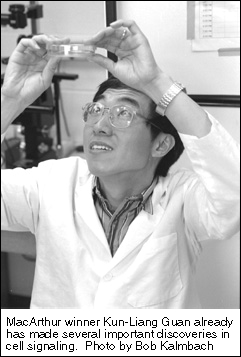The University Record, June 10, 1998
Biochemist Kun-Liang Guan named a MacArthur Fellow
By Jane R. Elgass
 When biochemist Kun-Liang Guan first heard that he’d be receiving money from the John D. and Catherine T. MacArthur Foundation, he thought the funds were for his research and wanted them sent to his department.
When biochemist Kun-Liang Guan first heard that he’d be receiving money from the John D. and Catherine T. MacArthur Foundation, he thought the funds were for his research and wanted them sent to his department.
“Then I realized it was for me, that I could use it for anything. It was a big, wonderful surprise,” says the associate professor of biological chemistry and senior research associate at the Institute of Gerontology.
As one of 29 MacArthur Fellows announced last week, Guan will receive $230,000 over five years, no strings attached. He hasn’t yet decided what he will do with the money, but the thought of taking a sabbatical that would enhance his career has some appeal.
Guan joined the U-M in 1991. He had done postdoctoral work in Jack Dixon’s laboratory at Purdue University and had interviewed here at the Institute of Gerontology. When Dixon came here as chair of the Department of Biological Chemistry, Guan came along.
He’s pleased with that decision. The U-M environment “is really wonderful for me,” he says, “and I really appreciate the support of the department. My colleagues are wonderful.
“I’ve had opportunities to move, but stayed because of wonderful colleagues, the support of my chair and the research environment.”
Guan studies a class of enzymes that act as molecular switches controlling the activity of other enzymes. He has shown how these enzymes control normal physiologic processes (such as proliferation and differentiation) and how viruses and bacteria interrupt normal functions, creating pathogenic effects.
His research has helped explain how cells regulate internal processes, such as division, and how they respond to external conditions, such as infection.
“Kun-Liang is a very bright and highly creative scientist,” says biochemistry Prof. Michael Marletta, who was awarded a MacArthur grant in 1995. “He has an ability to see things that others have missed and consequently has already made several very important discoveries in the cell signaling area. His discoveries will continue and he will prove to be an inspired choice by the MacArthur Foundation. I am very happy for him and his hard-working students. They all share in this honor.”
Gilbert S. Omenn, executive vice president for medical affairs, was in on early discussions that led to the creation of the MacArthur Fellows program, which he notes has had a number of U-M recipients.
“The suggestion was to make a difference around people, find people to invest in, and we think Guan is a terrific investment,” Omenn says. “His work on signals in cells has huge ramifications. This is really wonderful.”
Dixon, who is the Minor J. Coon Professor of Biological Chemistry, says Guan “is one of those people who everyone likes to have in their department. He bubbles with ideas and always has something critical and important to say on scientific issues. He’s my next door colleague. When I have important science questions, I go ask him what he thinks. He is quick to seize new ideas and see clearly through a mixture of jumbled facts right to the key issue every time.”
Dixon notes that the individuals in Guan’s lab “all think very highly of him. The graduate students and postdocs have a wonderful place to train.”
Dixon also cited the happy coincidence of having two MacArthur winners in his department in a short time. “We’re really fortunate to have two such distinguished people in biological chemistry. I think it’s just great.”
Guan received a B.S. in 1982 from Hangzhou University in China, and a Ph.D. in 1989 from Purdue University. Born in 1963 in Tongxian, China, he joined the U-M in 1991 as a lecturer in the Department of Biological Chemistry.
U boasts 11 MacArthur winners
In addition to Guan, 10 U-M faculty have been named MacArthur Fellows: Robert Axelrod (public policy, 1987), Ruth Behar (anthropology, 1988), Alice Fulton (English, 1991), John Holland (psychology and computer science, 1992), Stephen Lee (chemistry, 1981), Michael Marletta (biochemistry, 1995), Vonnie McLoyd (psychology, 1996, now at Duke University), Thylias Moss (English, 1996), Rebecca Scott (history, 1990), and Henry Wright (anthropology, 1993).
The John D. and Catherine T. MacArthur Foundation is one of the largest private philanthropic foundations in the United States. Through its work, the foundation “seeks lasting solutions to critical problems throughout the world by investing in creative people and ideas.”

